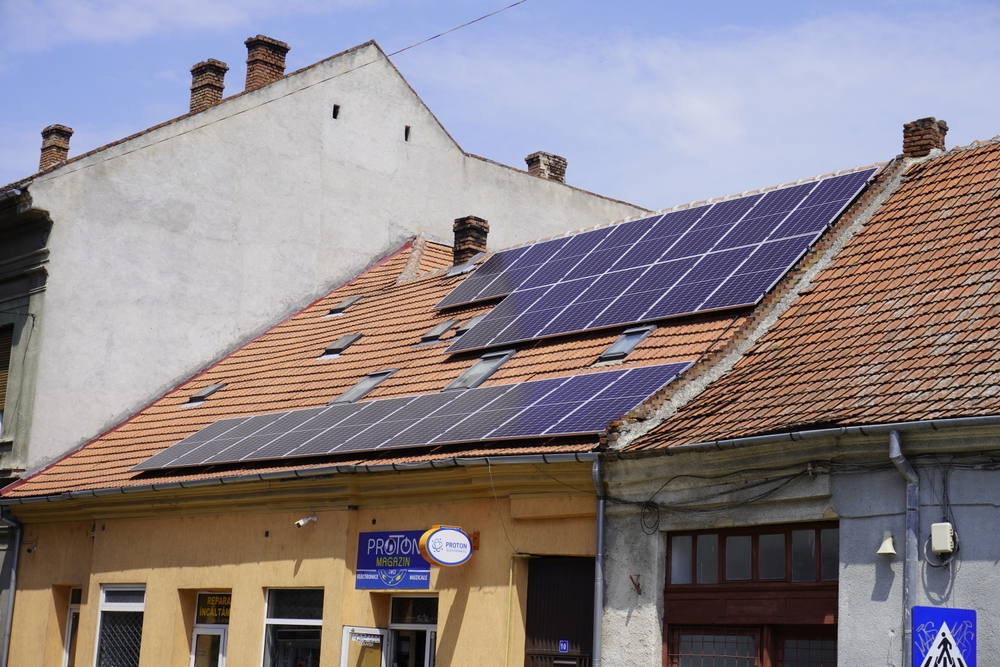
Installation of photovoltaic panels in Arad, Romania © Korosi Francois-Zoltan/Shutterstock
In Romania, also thanks to dedicated European funds, the number of photovoltaic panels installed is growing rapidly. So quickly, that some programmes have been suspended, as the increase in energy production strains the distribution network, which is still obsolete
Sector studies indicate that more than 50% of Romanians living in a detached house during 2023 declared themselves interested in purchasing a photovoltaic system. In fact, demand for photovoltaic panels increased tenfold in 2022 compared to the previous year.
An ever-growing trend, in line with European policies regarding renewable energy sources that have made billions of Euros available for the green transition.
In addition to the National Recovery and Resilience Plan, Romanians can also access two other programmes that provide European funds for investments in renewable energy: the Modernization Fund - managed by the Ministry of Energy - and Repower EU - managed by the Ministry of Investments and European Funds .
The most popular programme so far has been "Green House", through which the state grants up to 20 thousand lei (approximately 4000 Euros) for the installation of solar panels, while the remaining part of two thousand lei (400 Euros) must be added by the household, that can however recover the sum from the first year of use of the panels.
However, interested parties often have to pay for the panels in full out of their own pocket and in this case, according to experts, the investment could be recovered in around 4-5 years.
However, the demand for solar panel systems in Romania remains far above the supply. The latest report from the National Energy Regulatory Authority (ANRE) on the situation of prosumers (energy consumers and producers) shows that the rate of connections to distribution networks is continuously increasing. Last July, an average of 236 connections per day was reached, while six months ago there were less than 150 connections per day.
Too many panels, too much solar energy
Recently George Niculescu, the president of ANRE, also expressed his opinion publicly on the installation of photovoltaic panels. According to Niculescu, it would be necessary to impose a threshold for the installation of photovoltaic panels by prosumers, a threshold that should therefore be set based on their consumption needs and each individual area.
Niculescu says prosumers have started installing photovoltaic panels that produce more than they consume. This habit, however, creates imbalances in the network.
Furthermore, the ANRE president reiterates that the role of prosumers is to make the energy system more efficient and lead to a reduction in bills, especially in this period in which high prices have a massive impact on the costs of electricity and gas. But despite this being the main purpose, "speculators" often install photovoltaic systems to make a profit.
According to the law, excess energy is fed into the grid and the owner of the photovoltaic system receives money for every kilowatt hour produced, market operators point out. In practice, owning photovoltaic panels has become a business. But without the imposition of limits, this business could backfire on prosumers, since the electricity grid is now dated and awaits the investments proposed with the PNRR.
According to ANRE data, prosumers can sell the electricity produced and fed into the networks to the electricity suppliers with whom they have stipulated electricity supply contracts, network permitting.
The Green House 2023 programme suspended since September
The Environmental Fund Administration (AFM) announced in September that it had suspended the Green House Photovoltaic Programme after a decision by the Court of Appeal of Oradea in a case opened by one of the companies that had not been validated for the installation of panels.
Meanwhile, 90,000 members of the programme are still waiting for the panels to be mounted on the roofs of their homes. Recently there have been assurances from the Minister of the Environment, Mircea Fechet, according to which all deadlines will be extended, so that no one loses the funding.
Currently, more than 14 large wind farms and more than 21 parks with photovoltaic panels operate in Romania. At the end of next year, the largest photovoltaic park in Europe (100 hectares, 1000 megawatts of power) will be inaugurated in Arad, a private investment of around 1 billion Euros.
According to data released by ANRE, wind plants in Romania produce around 3,000 megawatts annually, photovoltaic plants produce 1500 megawatts, while the rest of over 6,000 megawatts concerns hydroelectric energy.
The National Strategy and Forecasting Commission highlights that in the period 2024-2026 the electricity produced by photovoltaic systems could record an average annual increase of 18.9%.
“In response to the difficulties and disruptions in the global energy market caused by the Russian invasion of Ukraine, the European Commission is implementing the REPowerEU plan”, reads the Commission's website. Launched in May 2022, REPowerEU aims to help EU states save energy, produce clean energy, and diversify energy supply.
REPowerEU brings 1.4 billion Euros to Romania, funds that must accelerate the green transition and stimulate investments in renewable energy: by 2030, Romania has proposed to have 30% of its electricity produced from green sources.
Meanwhile, Bucharest has officially presented to Brussels the request for revision of the National Recovery and Resilience Plan and presented the RePowerEU plan, with a total value of over 1.4 billion Euros, through which the government wants to allocate money for the purchase of panels and batteries for energy storage, home renovations to reduce energy consumption, but also other energy projects, such as irrigation with floating solar panels and investments in pumping equipment.
One of the measures will consist in establishing information desks for those who want to invest in the energy efficiency of buildings.
This content is published in the context of the "Energy4Future" project co-financed by the European Union (EU). The EU is in no way responsible for the information or views expressed within the framework of the project. The responsibility for the contents lies solely with OBC Transeuropa. Go to the "Energy4Future"






